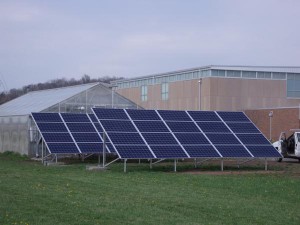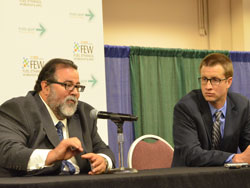Kansans want more solar. A recent poll finds 73 percent of Kansans agree that the opportunity for homeowners to adopt solar energy is an important part of providing choice and competition. In addition, 79 percent of respondents agree that Kansas could benefit from new jobs created by the solar industry. Today, one of every 78 jobs in the U.S. is in the solar industry. The poll was conducted by Magellan Strategies and commissioned by The Alliance for Solar Choice (TASC).

This 10 kW ground-mount at @PLHSKAWS features 40 @SolarWorldUSA panels and @IronRidge racks in Perry, KS. #KSSolar Photo Credit: Cromwell Solar
“Solar jobs in Kansas have been increasing at a rate over 30% each year; these are good-paying, skilled jobs that are at risk if Westar attempts to eliminate solar competition,” said Aron Cromwell, CEO Cromwell Solar, based in Lawrence, Kansas.
According to TASC, Westar Energy awaits the Kansas Corporation Commission’s ruling on a proposal that would impose higher tariffs on solar customers in its service territory. The proposed change would force solar customers onto discriminatory rates with high monthly charges that will stop the growing solar market in Kansas. TASC and Cromwell Solar have petitioned to intervene in the rate case to advocate for residential rates that encourage consumer energy choice. Westar has opposed both parties’ participation in the case.
Additional finding include that 76 percent of Westar customers oppose Westar’s proposal to impose a tariff fee on customers with solar panels. With 80 percent of Republicans and 75 percent of Democrats agreeing that their utilities’ positions on clean energy are based on what’s best for these companies’ profits, the results, said TASC, call into question Westar Energy’s motives in proposing this anti-solar change.
“It is rare to see this level of bipartisan support for anything, but it is clear from these results that Kansans will not stand for Westar Energy or any utility to take away their ability to install solar,” said David Flaherty, CEO of Magellan Strategies.
Westar’s rate case is pending before the Kansas Corporation Commission. Public hearings are planned for July 21 and 23. The Commission should issue an order by the fall.










